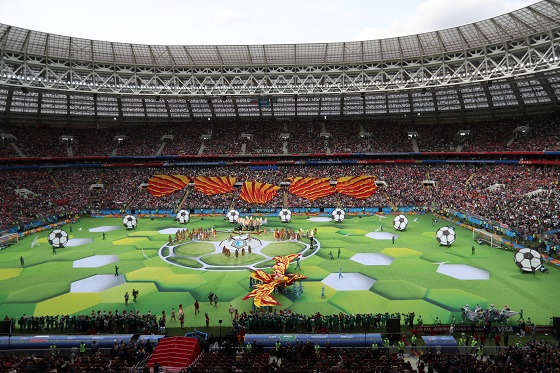Russia kicks off WC with a promise to 'live it up'
Published : 14 Jun 2018, 21:58
Upon outlining plans to host the 2018 World Cup eight years ago, Russian President Vladimir Putin envisaged a celebration of football "filled with passion and emotion".
On Thursday, in a glittering opening ceremony witnessed by 80,000 fans at Moscow's Luzhniki Stadium and a worldwide audience of hundreds of millions, that promise came to fruition.
Football's flagship tournament was officially opened with a short but spectacular extravaganza that featured acts from British pop star Robbie Williams, Russian soprano Aida Garifullina and a symbolic first kick from legendary Brazil striker Ronaldo.
It also included emotive performances from Russian musicians Yuri Bashmet, Daniil Trifonov and Alexander Boldachev. In addition, some 500 dancers, gymnasts and trampolinists took part in the show, as did 140 volunteers.
The theme of the World Cup is Live it Up and after a reflective opening to the soundtrack of classical music, spectators were brought to their feet with Williams' 2000 hit Rock DJ and a dazzling fireworks display.
Russia spent around 12 billion US dollars to prepare for the World Cup, including new and revamped stadiums, training facilities, hotels and transport links.
Another 200 million dollars have been spent on legacy programs such as youth development initiatives and refurbishments to ensure facilities do not go to waste after the event.
"Our country is ready to host the FIFA World Cup, and provide everyone who will come to Russia with maximum comfort and the best emotions possible," Putin said during the week at the 68th FIFA Congress, held in Moscow.
Despite concerns about some stadium delays, organizers have declared all venues ready for the mega-event.
 FAVORITES
FAVORITES
So with preparations complete, the football world's attention has now shifted to the action on the pitch. And early indications suggest that this will be an enthralling tournament.
Unlike previous World Cup finals, where the title contenders can often be narrowed down to three or four teams, this year's edition is wide open.
Brazil and Germany are the slight favorites, having both breezed through qualifying. Their superb World Cup record - between them they have won nine of the 20 previous tournaments - means it almost seems their right to progress to the latter stages of the competition.
Brazil are looking particularly sharp. The Selecao have won 17 and lost just one of their 21 matches since coach Tite took charge in June 2016. Adding to the optimism in the South American team's camp has been the successful recovery of Neymar from a foot injury. Following three months on the sidelines, the 26-year-old made a scoring return in Brazil's 2-0 friendly victory over Croatia on June 3. He followed that with another goal in Brazil's final World Cup warmup match against Austria a week later, which Brazil won 3-0.
Despite their unconvincing form in recent friendlies, Germany's talent and depth suggest that a repeat of their 2014 title is a major possibility. Arguably the defending champions' biggest strength is the tactical mastery of coach Joachim Low, who has taken the use of data analytics to a new level and has proven himself to be an astute reader of the game.
Spain, rated among the frontrunners by most pundits a week ago, now look in disarray. Wednesday's shock sacking of coach Julen Lopetegui, which came a day after it emerged that he had agreed to coach Real Madrid after the tournament, will likely take its toll on the 2010 champions. Months of preparations under Lopetegui have been thrown out the window and the Roja must now adapt to new tactics, systems and ideas of interim coach Fernando Hierro. They have been given less than 72 hours to do so before their World Cup opener against Portugal.
France's raft of young forwards - including Antoine Griezmann, Kylian Mbappe and Thomas Lemar - means they must be considered a threat, even if that level of quality is not quite matched in midfield or defence.
Argentina must be considered a chance, if only for the presence of Lionel Messi in their team. However there are serious doubts about whether the Albiceleste's midfield can cut it against their stronger rivals.
Belgium's golden generation shows no signs of fading and, just like in 2014, they will enter this tournament as a good chance of at least making it to the last eight. There are few weakness in Roberto Martinez's squad and opposition defences will not be looking forward to quelling the attacking threat posed by Eden Hazard, Romelu Lukaku and Kevin de Bruyne.
Others with outside chances of reaching the latter stages of the tournament are Portugal, Denmark, Uruguay, England and Colombia.


